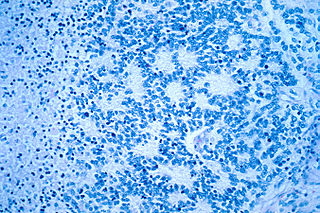
Ray Kruse Iles is a biomedical scientist who was head of the Williamson Laboratory for Molecular Oncology at St Bartholomew's Hospital in London. [1]

Ray Kruse Iles is a biomedical scientist who was head of the Williamson Laboratory for Molecular Oncology at St Bartholomew's Hospital in London. [1]
Iles has a particular interest in the interface between rational processing, emotional motivation and endocrinology. [2]
He co-founded the ELK-Health Foundation, with psychotherapist Tadhg Ó Séaghdha, in 2004. The ELK-Foundation Health (named after Iles's father, Eric Leonard Kruse) is now the National Institutes for Stress, Anxiety and Depression (NISAD), centred in Lund, Sweden. It still uses the ELK-Health name in its programmes and clinics, which support people needing to change habits that harm their physical and emotional health.
Iles's interest in women's and reproduction health led him, in 2011, to become the founding director of the biomarker diagnostic company MAPSciences. [3]
Iles is the inventor of new diagnostic technology, six clinical screening tests for pregnancy disorders and Downs Syndrome/prenatal diagnosis, [4] [5] [6] [7] [8] [9] haemoglobinopathies, thalassemia, [10] and diabetes, [11] and two cancer-related patents. [12] [13]
His academic career, after leaving St Bartholomew's, included being Professor of Biomedical Science at Middlesex University heading a Biomedical Science Research Facility, which incorporated molecular pathology, bio-modelling/bioinformatics and environmental health, [14] [15] and then Anglia Ruskin University. [16]
Formerly a regular contributor to Kumar and Clark's Clinical Medicine, [17] Iles left academia to concentrate on the two organisations that he co-founded, NISAD and MapSciences.
In 2012, with Suzanne Docherty, he published the textbook Biomedical Science: Essential Laboratory Medicine. [5]
NISAD has supported several research projects of Iles and his students in bioanalysis, [18] cancer research, [19] [20] fertility [21] and prenatal care and child development. [22] [23] [24]
In 2019 Iles became founding dean at Abu Dhabi University’s College of Health Sciences. In July 2020 he became visiting professor at the Laboratory of Viral Zoonotics, University of Cambridge. [25]
As a boy Iles attended Mellow Lane Comprehensive School in Hayes, Middlesex. [26]
His cousin is the UK Olympic fencer Richard Kruse, which was the subject of the BBC Radio programme Tracing your Roots. [25]

Urology, also known as genitourinary surgery, is the branch of medicine that focuses on surgical and medical diseases of the urinary system and the reproductive organs. Organs under the domain of urology include the kidneys, adrenal glands, ureters, urinary bladder, urethra, and the male reproductive organs.

Small-cell carcinoma is a type of highly malignant cancer that most commonly arises within the lung, although it can occasionally arise in other body sites, such as the cervix, prostate, and gastrointestinal tract. Compared to non-small cell carcinoma, small cell carcinoma is more aggressive, with a shorter doubling time, higher growth fraction, and earlier development of metastases.

Glioblastoma, previously known as glioblastoma multiforme (GBM), is the most aggressive and most common type of cancer that originates in the brain, and has a very poor prognosis for survival. Initial signs and symptoms of glioblastoma are nonspecific. They may include headaches, personality changes, nausea, and symptoms similar to those of a stroke. Symptoms often worsen rapidly and may progress to unconsciousness.

Metabolomics is the scientific study of chemical processes involving metabolites, the small molecule substrates, intermediates, and products of cell metabolism. Specifically, metabolomics is the "systematic study of the unique chemical fingerprints that specific cellular processes leave behind", the study of their small-molecule metabolite profiles. The metabolome represents the complete set of metabolites in a biological cell, tissue, organ, or organism, which are the end products of cellular processes. Messenger RNA (mRNA), gene expression data, and proteomic analyses reveal the set of gene products being produced in the cell, data that represents one aspect of cellular function. Conversely, metabolic profiling can give an instantaneous snapshot of the physiology of that cell, and thus, metabolomics provides a direct "functional readout of the physiological state" of an organism. There are indeed quantifiable correlations between the metabolome and the other cellular ensembles, which can be used to predict metabolite abundances in biological samples from, for example mRNA abundances. One of the ultimate challenges of systems biology is to integrate metabolomics with all other -omics information to provide a better understanding of cellular biology.

In medicine, proton therapy, or proton radiotherapy, is a type of particle therapy that uses a beam of protons to irradiate diseased tissue, most often to treat cancer. The chief advantage of proton therapy over other types of external beam radiotherapy is that the dose of protons is deposited over a narrow range of depth; hence in minimal entry, exit, or scattered radiation dose to healthy nearby tissues.

Hereditary nonpolyposis colorectal cancer (HNPCC) is a hereditary predisposition to colon cancer.

Neuroblastoma (NB) is a type of cancer that forms in certain types of nerve tissue. It most frequently starts from one of the adrenal glands but can also develop in the head, neck, chest, abdomen, or spine. Symptoms may include bone pain, a lump in the abdomen, neck, or chest, or a painless bluish lump under the skin.

Neuroendocrine tumors (NETs) are neoplasms that arise from cells of the endocrine (hormonal) and nervous systems. They most commonly occur in the intestine, where they are often called carcinoid tumors, but they are also found in the pancreas, lung, and the rest of the body.

Tipifarnib is a farnesyltransferase inhibitor. Farnesyltransferase inhibitors block the activity of the farnesyltransferase enzyme by inhibiting prenylation of the CAAX tail motif, which ultimately prevents Ras from binding to the membrane, rendering it inactive.

Transitional cell carcinoma is a type of cancer that arises from the transitional epithelium, a tissue lining the inner surface of these hollow organs. It typically occurs in the urothelium of the urinary system; in that case, it is also called urothelial carcinoma. It is the most common type of bladder cancer and cancer of the ureter, urethra, and urachus. Symptoms of urothelial carcinoma in the bladder include hematuria. Diagnosis includes urine analysis and imaging of the urinary tract (cystoscopy).
The Pennington Biomedical Research Center is a health science-focused research center in Baton Rouge, Louisiana. It is part of the Louisiana State University System and conducts clinical, basic, and population science research. It is the largest academically-based nutrition research center in the world, with the greatest number of obesity researchers on faculty. The center's over 500 employees occupy several buildings on the 222-acre (0.90 km2) campus. The center was designed by the Baton Rouge architect John Desmond.

The Society of Nuclear Medicine and Molecular Imaging (SNMMI), formerly the Society of Nuclear Medicine, is a nonprofit scientific and professional organization that promotes the science, technology and practical application of nuclear medicine and molecular imaging. SNMMI's mission is to improve human health by advancing molecular imaging and therapy.

GATA3 is a transcription factor that in humans is encoded by the GATA3 gene. Studies in animal models and humans indicate that it controls the expression of a wide range of biologically and clinically important genes.
The American Society of Clinical Oncology (ASCO) is a professional organization representing physicians of all oncology sub-specialties who care for people with cancer. Founded in 1964 by Fred Ansfield, Harry Bisel, Herman Freckman, Arnoldus Goudsmit, Robert Talley, William Wilson, and Jane C. Wright, it has nearly 45,000 members worldwide.

Oncology is a branch of medicine that deals with the study, treatment, diagnosis, and prevention of cancer. A medical professional who practices oncology is an oncologist. The name's etymological origin is the Greek word ὄγκος (ónkos), meaning "tumor", "volume" or "mass". Oncology is concerned with:
Alan D. D'Andrea is an American cancer researcher and the Fuller American Cancer Society Professor of Radiation Oncology at Harvard Medical School. D'Andrea's research at the Dana Farber Cancer Institute focuses on chromosome instability and cancer susceptibility. He is currently the director of the Center for DNA Damage and Repair and the director of the Susan F. Smith Center for Women's Cancer.

Anthony L. Komaroff is an American physician, clinical investigator, editor, and publisher. He serves as the Distinguished Simcox-Clifford-Higby Professor of Medicine at Harvard Medical School and Senior Physician at Brigham and Women's Hospital in Boston.
Jason S. Lewis is a British radiochemist whose work relates to oncologic therapy and diagnosis. His research focus is a molecular imaging-based program focused on radiopharmaceutical development as well as the study of multimodality small- and biomolecule-based agents and their clinical translation. He has worked on the development of small molecules as well as radiolabeled peptides and antibodies probing the overexpression of receptors and antigens on tumors.
Urinary cell-free DNA (ucfDNA) refers to DNA fragments in urine released by urogenital and non-urogenital cells. Shed cells on urogenital tract release high- or low-molecular-weight DNA fragments via apoptosis and necrosis, while circulating cell-free DNA (cfDNA) that passes through glomerular pores contributes to low-molecular-weight DNA. Most of the ucfDNA is low-molecular-weight DNA in the size of 150-250 base pairs. The detection of ucfDNA composition allows the quantification of cfDNA, circulating tumour DNA, and cell-free fetal DNA components. Many commercial kits and devices have been developed for ucfDNA isolation, quantification, and quality assessment.

Nicholas Pierino Tatonetti is an American bioscientist who is Vice Chair of Operations in the Department of Computational Biomedicine and Associate Director of Computational Oncology in the Cancer Center at Cedars-Sinai Medical Center in Los Angeles, California.